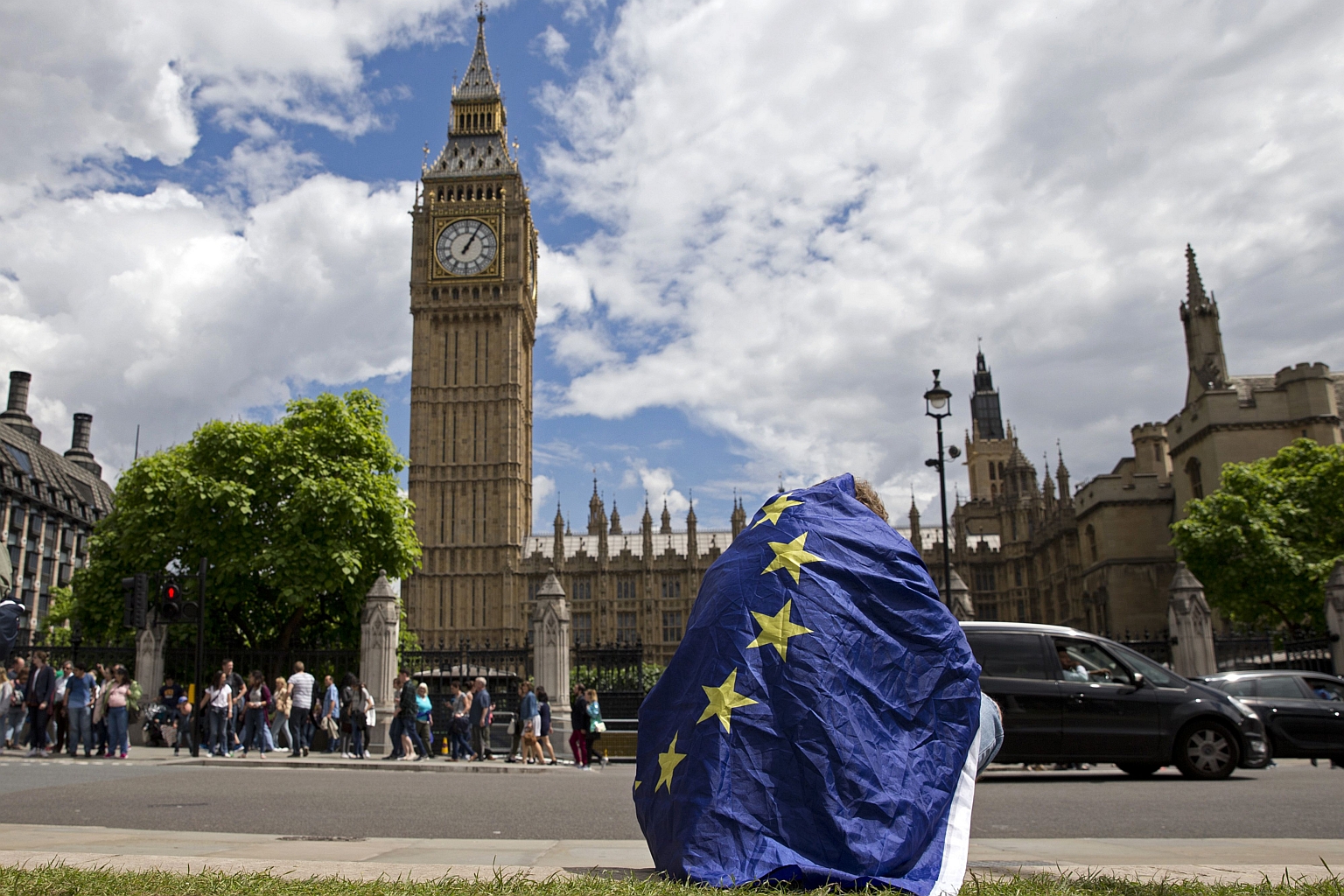Brexit: 6 latest questions (un)answered
Sign up now: Get ST's newsletters delivered to your inbox

A demonstrator draped in an EU flag sits on floor during a protest against the outcome of the UK's June 23 referendum on the European Union, in central London on June 25.
PHOTO: AFP
Follow topic:
Britain is flailing with its shock decision to leave the European Union, or Brexit, four days after the June 23 referendum. Here are some of the questions the people, investors and even leaders are asking:
1. When will Britain trigger its 'divorce' from the EU?
Prime Minister David Cameron said hours after the Brexit vote he would resign by October - and it would be up to his successor to trigger the formal divorce process that will set the clock ticking on a two-year countdown to Britain's departure from the EU.
His finance minister George Osborne and likely successor, former London mayor and Brexit supporter Boris Johnson, also insisted on Monday (June 27) that Britain will quit the EU only when it's ready.
His finance minister George Osborne and likely successor, former London mayor and Brexit supporter Boris Johnson, also insisted on Monday (June 27) that Britain will quit the EU only when it's ready.
But European Parliament chief Martin Schulz has called for the process to be launched as soon as possible, and said a summit of EU leaders on Tuesday (June 28) was the "right time" to begin.
2. Can Brexit be overturned by a second referendum or blocked by Parliament?
More than 3 million Britons have signed a petition calling for a second referendum. Some MPs who want Britain to remain in the EU say it is within parliament's powers to call a second referendum, but former PM Tony Blair has said it will be very hard to overturn the result of the June 23 vote.
Yet some ruling and opposition party MPs like Conservative grandee Michael Heseltine who support "Remain" now say they need not listen to the "madness" of the people and could vote in Parliament to stop Brexit.
"There is no way you are going to get those people (pro-Remain MPs) to say black is white and change their minds unless a) they know what the deal is and b) it has been supported either by an election or by another referendum," Lord Heseltine told Sky News. "So there's a dramatic urgency to get on with the negotiations."
3. How big is the threat to the global economy?
Some investors and analysts are whispering that Brexit poses the biggest threat to the financial system since the collapse of Lehman Brothers. Others say it's the biggest challenge to the Western political order since World War II. While key indicators of credit market stress jumped on Friday, they're still considerably lower than the heights of the financial crisis in 2008.
Regulators have also taken any number of steps since then to fortify the banks and reduce market risks. And central banks are ready on the sidelines. So far at least, the crisis seems contained.
Still, Britain is likely to enter recession within the year as a result of the Brexit vote, and global economic growth will be stunted, Goldman Sachs' top economists said on Sunday. They expect the political, economic and regulatory uncertainty following the vote to chop a cumulative 2.75 per cent off UK gross domestic product in the next 18 months. Goldman also expects eurozone GDP over the next two years to average 1.25 per cent versus 1.5 per cent before the Brexit vote.
For the US economy, the bank now expects GDP growth in the second half of 2016 to come in at 2.0 per cent versus a forecast of 2.25 per cent previously.
4. Who will replace David Cameron as Prime Minister?
Former London mayor Boris Johnson, whose support galvanised the "Leave" campaign, is favourite to replace Mr Cameron. The Sunday Telegraph reported that he will announce his candidacy to be prime minister in coming days and present himself as a liberal with a social conscience.
But there is a group of pro-Cameron lawmakers looking for "anyone but Boris", media reports said. Foreign Minister Philip Hammond, who has ruled himself out of the contest, said: "It's got to be somebody who can unite the Conservative Party ... but it's also got to be somebody with a credible strategy for dealing ... with the challenge of negotiating an exit from the European Union without destroying our prosperity in the process."
5. Will the United Kingdom break up?
Scotland voted by 62 per cent to stay in the EU, and the prospect of being pulled out against their will has renewed support for independence from its 300-year-old union with England and Wales.
Scottish First Minister Nicola Sturgeon has said a second independence vote - Scots had voted to stay in the UK in a referendum in 2014 - was now "highly likely", and a meeting of her Cabinet on Saturday agreed to start drawing up the necessary legislation.
Northern Ireland's nationalist Sinn Fein party, which shares power in the government in Belfast, has called for a referendum in the British-ruled province on uniting with the Republic of Ireland to the south.
6. What happens to the 3.3 million EU citizens living in the UK?
No one knows for sure. Leading 'Leave' campaigners including UK Independence Party leader Nigel Farage claimed during the campaign that EU nationals working in the UK should be able to stay in the event of a Brexit. Those who have lived in the UK for more than five years can already apply for permanent residence. In the last week of the campaign, Mr Johnson also proposed amnesty for migrants who entered the country illegally more than 12 years ago.
SOURCES: BLOOMBERG, AGENCE FRANCE-PRESSE, GUARDIAN, REUTERS

